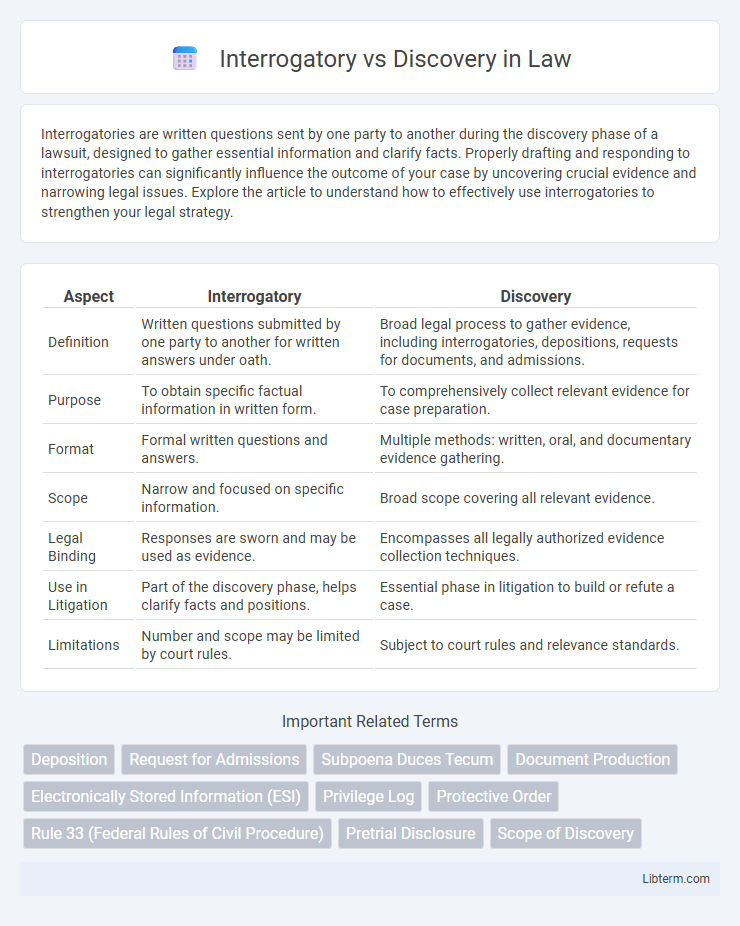Interrogatories are written questions sent by one party to another during the discovery phase of a lawsuit, designed to gather essential information and clarify facts. Properly drafting and responding to interrogatories can significantly influence the outcome of your case by uncovering crucial evidence and narrowing legal issues. Explore the article to understand how to effectively use interrogatories to strengthen your legal strategy.
Table of Comparison
| Aspect | Interrogatory | Discovery |
|---|---|---|
| Definition | Written questions submitted by one party to another for written answers under oath. | Broad legal process to gather evidence, including interrogatories, depositions, requests for documents, and admissions. |
| Purpose | To obtain specific factual information in written form. | To comprehensively collect relevant evidence for case preparation. |
| Format | Formal written questions and answers. | Multiple methods: written, oral, and documentary evidence gathering. |
| Scope | Narrow and focused on specific information. | Broad scope covering all relevant evidence. |
| Legal Binding | Responses are sworn and may be used as evidence. | Encompasses all legally authorized evidence collection techniques. |
| Use in Litigation | Part of the discovery phase, helps clarify facts and positions. | Essential phase in litigation to build or refute a case. |
| Limitations | Number and scope may be limited by court rules. | Subject to court rules and relevance standards. |
Understanding Interrogatories in Legal Proceedings
Interrogatories are written questions submitted by one party to another in legal proceedings, designed to gather detailed information relevant to the case. They are a key component of the discovery process, enabling parties to obtain factual evidence, clarify issues, and establish the basis for further investigation. Properly responding to interrogatories requires accuracy and completeness, as these answers hold significant weight in building legal strategies and can be used as evidence in court.
What Is Discovery in Law?
Discovery in law is the pre-trial process where parties exchange relevant information and evidence to build their cases. It includes various methods such as interrogatories, depositions, requests for production, and requests for admission. This phase aims to prevent surprises, clarify facts, and promote fair litigation by ensuring all parties have access to critical legal documents and testimony.
Key Differences Between Interrogatory and Discovery
Interrogatories are written questions sent by one party to another in a lawsuit, requiring written answers that are signed under oath, primarily used to gather specific factual information. Discovery, a broader pre-trial process, encompasses various methods including interrogatories, depositions, requests for production, and requests for admission to comprehensively collect evidence and clarify case details. The key difference lies in the scope: interrogatories are a subset of discovery focused on written Q&A, while discovery covers all tools used to obtain information before trial.
Types of Interrogatories Used in Litigation
Interrogatories in litigation typically include form interrogatories, which cover general information and standardized questions, and special interrogatories tailored to specific case facts. These written questions require detailed party responses under oath, serving as a cost-effective tool for fact-finding before trial. Unlike other discovery methods such as depositions or requests for production, interrogatories concentrate on obtaining clear, concise statements related to issues like liability, damages, and witness identification.
Components of the Discovery Process
Interrogatories are written questions served to parties in a lawsuit as a key component of the discovery process, designed to gather detailed, factual information under oath. The discovery process also includes depositions, requests for production of documents, and requests for admissions, each serving to uncover evidence and clarify issues before trial. Effective use of these components ensures comprehensive fact-finding, streamlines case preparation, and aids in strategy development.
Purpose and Importance of Interrogatories
Interrogatories serve as a critical tool in the discovery phase of litigation, allowing parties to obtain written, sworn answers to specific questions to clarify facts and narrow issues before trial. Their purpose is to streamline the discovery process, reduce surprises, and gather essential information that shapes case strategy and settlement discussions. The importance of interrogatories lies in their ability to efficiently pinpoint key evidence, establish timelines, and uncover vital details without the expense and complexity of depositions or subpoenas.
Scope and Limits of Legal Discovery
Interrogatories are written questions served on parties involved in litigation, designed to obtain factual information and clarify issues within the scope defined by the court's discovery rules. The scope of legal discovery encompasses all non-privileged information relevant to the subject matter of the case, subject to proportionality and confidentiality limits outlined in procedural rules like FRCP Rule 26. Legal discovery aims to balance thorough fact-finding with protecting parties from undue burden, limiting inquiry to information reasonably calculated to lead to admissible evidence.
How Interrogatories Influence Discovery Outcomes
Interrogatories play a crucial role in shaping discovery outcomes by soliciting detailed written responses that clarify facts and narrow the scope of legal disputes. They help identify key evidence, streamline depositions, and pinpoint witness testimonies, reducing litigation time and costs. Effectively crafted interrogatories enhance case strategy by uncovering inconsistencies and strengthening the party's position before trial.
Common Challenges in Interrogatories and Discovery
Interrogatories often face challenges such as vague or overly broad questions, incomplete or evasive responses, and the need to carefully navigate privilege claims. Discovery processes can be hindered by the sheer volume of documents, costly and time-consuming data review, and disputes over the relevance or scope of requested materials. Both require strategic planning and clear communication to avoid delays and ensure compliance with legal standards.
Best Practices for Effective Discovery Responses
Effective discovery responses require precise and comprehensive answers to interrogatories, ensuring all relevant information is disclosed clearly to avoid objections or delays. Utilizing detailed yet concise language, referencing specific documents or evidence where appropriate, enhances clarity and supports credibility during litigation. Regular collaboration with legal counsel to review responses and verify accuracy safeguards against incomplete or inaccurate disclosures that could jeopardize case strategy.
Interrogatory Infographic

 libterm.com
libterm.com